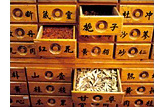
Unsubscribe
Update e-mail address
March 2008 [Volume 7, Issue 3]
To Your Health is brought to you by:
In this issue of To Your Health:
- Acupuncture May Help Pregnancy-Related Pain
- Herb of the Month – Notoginseng (san qi)
- Ask an Acupuncturist
Acupuncture May Help Pregnancy-Related Pain
 Pelvic and/or back pain is a common complaint among expectant mothers. Some studies have shown this is a problem for as many as 90 percent of pregnant women. A recent review study has found that acupuncture might be the solution for mom-to-be's aching back, particularly when combined with conventional care.
Pelvic and/or back pain is a common complaint among expectant mothers. Some studies have shown this is a problem for as many as 90 percent of pregnant women. A recent review study has found that acupuncture might be the solution for mom-to-be's aching back, particularly when combined with conventional care.
The researchers reviewed all published studies on acupuncture for pelvic or back pain during pregnancy, evaluating treatment effectiveness and safety. After sifting through 432 studies, the researchers concluded, "Overall, our review finds limited, though promising, evidence for the effectiveness of acupuncture in managing pelvic and back pain in pregnancy. In particular, there seems to be good evidence that acupuncture, in addition to standard treatment, is superior to standard treatment alone and stabilizing exercises for well-defined pregnancy-related pelvic pain. Given that acupuncture is a relatively safe procedure, these findings should encourage primary health care providers, obstetricians, and midwives to consider referring women to trained acupuncturists for management of this common, painful, and disabling condition."
While more research needs to be done, acupuncture may well offer effective pain relief for pregnant women.
For more information on the many benefits of Oriental medicine, visit www.acupuncturetoday.com.
Herb of the Month – Notoginseng (san qi)
 Notoginseng (also occasionally referred to as pseudoginseng) comes from a perennial plant native to East Asia. The roots of notoginseng are used in herbal preparations. After cleaning, the roots are dried in the sun and sliced.
Notoginseng (also occasionally referred to as pseudoginseng) comes from a perennial plant native to East Asia. The roots of notoginseng are used in herbal preparations. After cleaning, the roots are dried in the sun and sliced.
According to the principles of traditional Chinese medicine, notoginseng has sweet, bitter and warm properties, and is associated with the Liver and Stomach meridians. Its main functions are to stop bleeding, remove blood stasis and invigorate the blood. Notoginseng root can act as an analgesic, and is also believed to have anti-inflammatory, antiseptic, astringent, cardiotonic, discutient and diuretic properties. It is used to improve circulation and relieve pain, and to treat bleeding and swelling due to external soft-tissue injuries. There is also evidence that it can enhance physical performance. It can be taken either internally or externally.
The typical dosage of notoginseng is between 3 and 10 grams of sliced, dried root, ground into powder, then placed in boiling water and drunk as a decoction. For external uses, an appropriate amount may be applied directly to the skin, or mixed with oil and made into a type of poultice.
The American Herbal Products Association has given notoginseng a class 2B rating, meaning that it should not be used during pregnancy. In addition, there is evidence that suggests notoginseng may be adulterated with at least one other plant with a similar name. As of this writing, there are no known drug interactions associated with notigniseng. As always, make sure to consult with a licensed health care provider before taking notoginseng or any other herbal remedy or dietary supplement.
Question: How do you treat someone who would like to quit smoking or tobacco-chewing using acupuncture methods? What have your quit rates been using acupuncture or acupressure?
Answer: There are several different modalities of treatment for smoking cessation. Most involve points in the ear. The reason it is thought to work is that the treatment stimulates the endogenous release of neurotransmitters similar to those produced by nicotine that replace the nicotine-stimulated neurotransmitters. In addition, acupuncture treatment helps the body to clear the residue of tobacco from the body. Commitment to quit is still required. Treatment makes the process bearable. Success rates vary by individual. Sometimes smokers need several treatments or series of treatments. Sometimes heavy smokers quit overnight.
Have a question about acupuncture and Oriental medicine? Visit acupuncturetoday.com's "Ask an Acupuncturist" forum at www.acupuncturetoday.com/ask.
Unsubscribe
Thank you for subscribing to To Your Health. If you have received
this newsletter in error or wish to unsubscribe, you may remove your name
from our e-mail subscription list at www.acupuncturetoday.com/newsletter/TYH/unsubscribe.php.
Update your e-mail address
To update the e-mail address your newsletter is sent to, click here.
If you have any questions regarding your subscription, please complete this form at www.acupuncturetoday.com/newsletterhelp/TYH.
